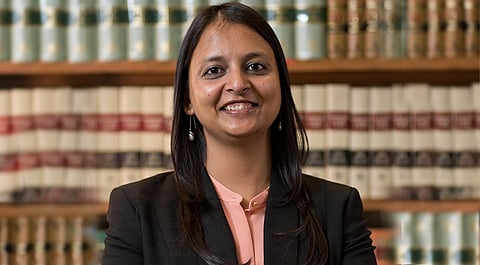
- News
- Columns
- Interviews
- Law Firms
- Apprentice Lawyer
- Legal Jobs
- हिंदी
- ಕನ್ನಡ

Renu Gupta
Section 15(2) of the Arbitration and Conciliation Act, 1996 specifies that in case the mandate of an arbitrator terminates, a substitute arbitrator shall be appointed according to the rules that were applicable to the appointment of the arbitrator being replaced.
This article explains that the rules applicable to the appointment of a substitute arbitrator are different where (i) the appointment of the initial arbitrator (sought to be substituted) was by the court under Section 11(6) of the Act and (ii) where Section 11(6) was not invoked for appointment of the initial arbitrator.
The Supreme Court in Yashwith Constructions v. Simplex Concrete Piles India was dealing with a case where the Managing Director of Simplex was appointed as the arbitrator in terms of the arbitration clause. Upon his resignation, the Managing Director of Simplex appointed the substitute arbitrator.
Yashwith filed a petition under Section 11(5) read with Section 15(2) seeking appointment of a substitute arbitrator. The Supreme Court did not find any infirmity with the appointment of substitute arbitrator by Simplex, as it was in accordance with the arbitration clause.
While dismissing the appeal, it held that Section 15(2) only means that the appointment of the substitute arbitrator must be done according to the original agreement or provision applicable to the appointment of the arbitrator at the “initial stage”. Therefore, where there was no occasion to invoke Section 11(6) of the Act for appointment of the initial arbitrator, there was no failure on the part of a party in not invoking Section 11(6) for appointment of the substituted arbitrator.
The specific fact situation before the Court only related to the appointment of a substitute arbitrator by a party, as was done in case of the earlier arbitrator, in accordance with the arbitration clause.
Therefore, the decision in Yashwith has to be understood to mean that (i) the “provision applicable to the appointment of the arbitrator at the initial stage” includes provisions other than those contained in the agreement (like recourse to court under Section 11) and (ii) the Court did not hold that in all cases of substitution of arbitrator, “rules” means the procedure specified in the arbitration agreement.
In ACC Limited v. Global Cements Limited, the Supreme Court was dealing with a case where the arbitration clause had specified two names as options for being arbitrators, in case disputes arose between the parties. After the death of the two named arbitrators, Global Cements invoked Section 11(6) of the Act and filed an application before the Bombay High Court.
ACC Limited argued that the arbitration clause does not survive the death of named arbitrators and that the parties never intended to refer their disputes to any person except the named persons. The application was allowed and an arbitrator was appointed. This was challenged before the Supreme Court.
The Court first answered the question that the arbitration clause, in this case, survives the death of named arbitrators, for the reason that the words in the clause were “if any dispute shall arise…at any time” and the phrase “at any time” means that the arbitration clause will survive as long as disputes exist between the parties.
After answering this question, while analysing Section 15(2) and relying on Yashwith, the Court observed that “no further application for appointment of an independent arbitrator under Section 11 will lie where there has been compliance with the procedure for appointment of a substitute arbitrator”.
It finally held that appointment of an arbitrator by the High Court was correct as the clause had named arbitrators and the parties could not have appointed anyone according to the clause after the death of the named arbitrators.
The decision in ACC Limited does not clearly answer the question. The facts before the Court did not involve a situation where the initial appointment was made under Section 11. Therefore, the decision in ACC Limited is not an authority on the issue of appointment of substitute arbitrator where the initial appointment of arbitrator was by the court under Section 11.
Two decisions of the Calcutta High Court and the Allahabad High Court have explained the law clearly on this issue. The Calcutta High Court in Ramjee Power Construction Ltd. v. Damodar Valley Corporation held that if it were the legislative intent that a substitute arbitrator should always be appointed in accordance with the procedure agreed upon by the parties, irrespective of the fact that the arbitrator being replaced was appointed by court under Section 11 of the Act, the legislature in Section 15(2) would not have used the expression “in accordance with the rules that were applicable to the appointment of the arbitrator being replaced”.
The High Court of Allahabad in Tirath Sumer Kumar v. Rakesh Kumar Mishra and others observed that Yashwith or ACC Limited do not lay down the proposition that the term “rules” under Section 15(2) means only the arbitration clause or that even if the earlier arbitrator had been appointed under Section 11(6), for appointment of a substitute arbitrator, parties will have to again follow the procedure under the arbitration clause prior to invoking Section 11(6) of the Act.
Conclusion
If the initial arbitrator was appointed by court under Section 11(6) of the Act, the appointment of a substitute arbitrator must be done according to the rules applicable at the initial stage, i.e., by invoking Section 11(6) of the Act. The parties do not need to start afresh by following the procedure for appointment of an arbitrator in the arbitration clause.
About the Author: Renu Gupta practices before the Delhi High Court and other courts and tribunals in Delhi.
Members of the Nani Palkivala Arbitration Arbitration Centre (NPAC) will be writing a weekly column for Bar & Bench analyzing the latest developments on the law of arbitration.
Read last week’s column here.